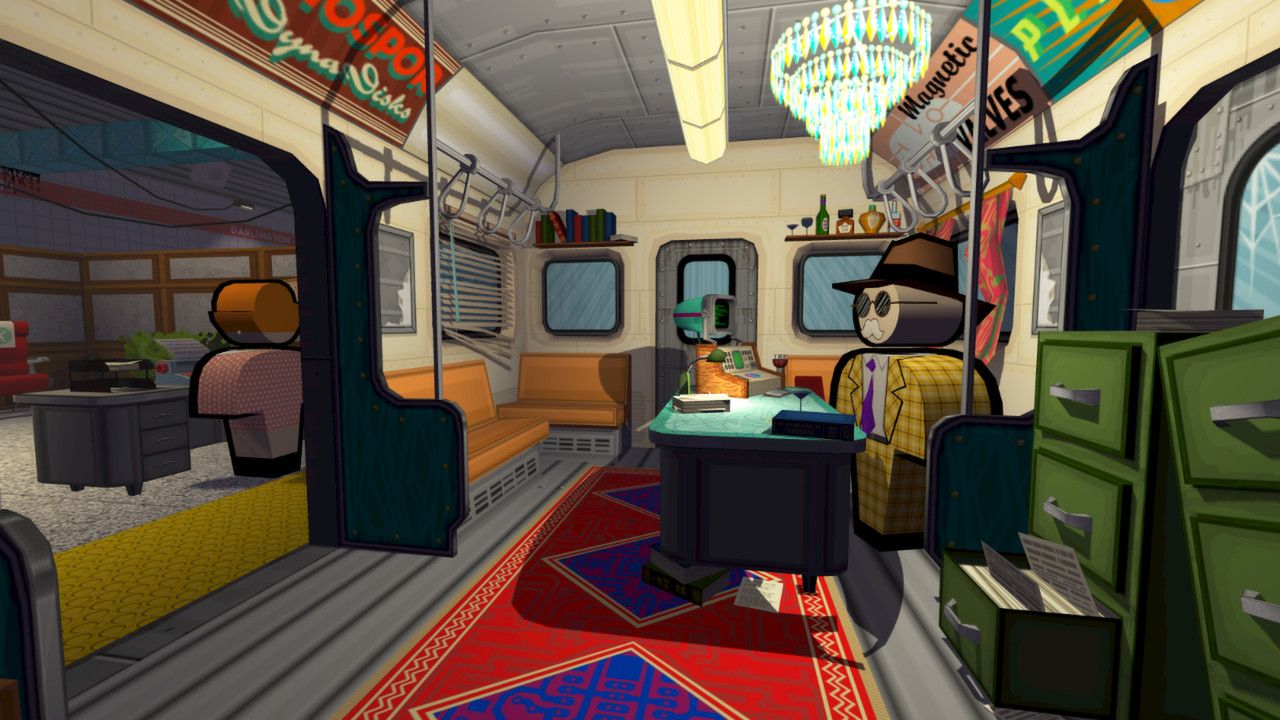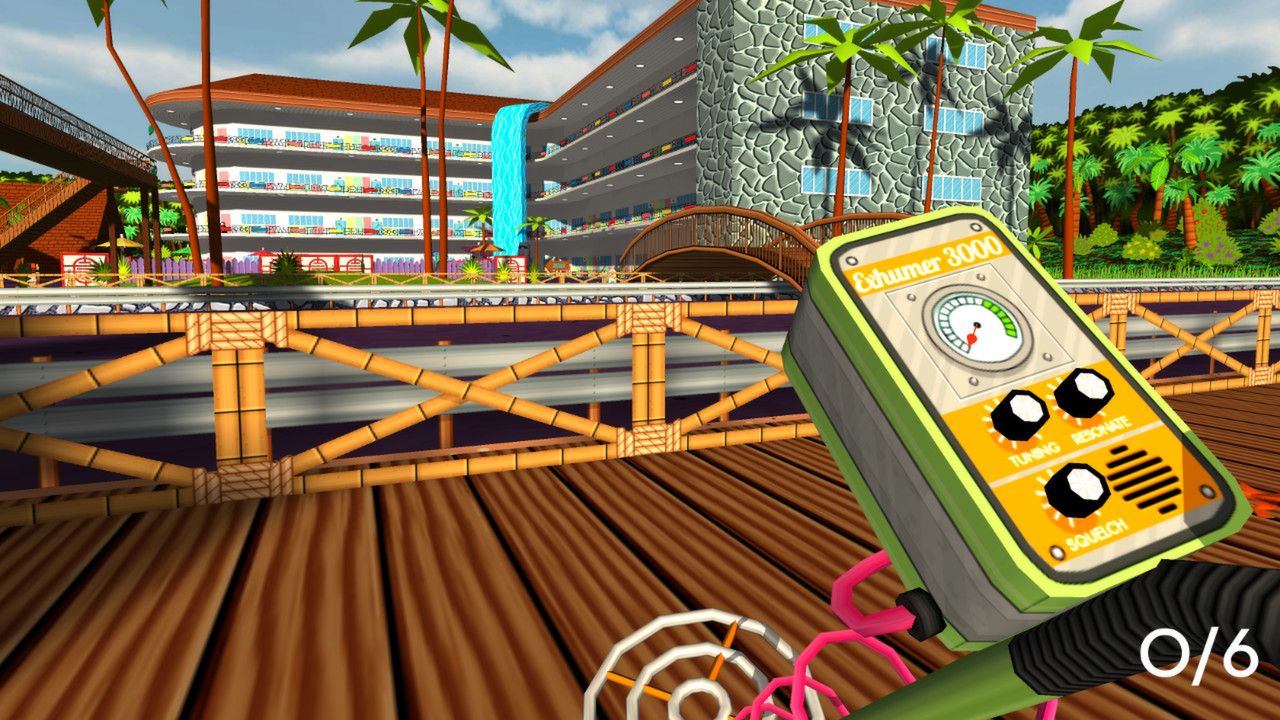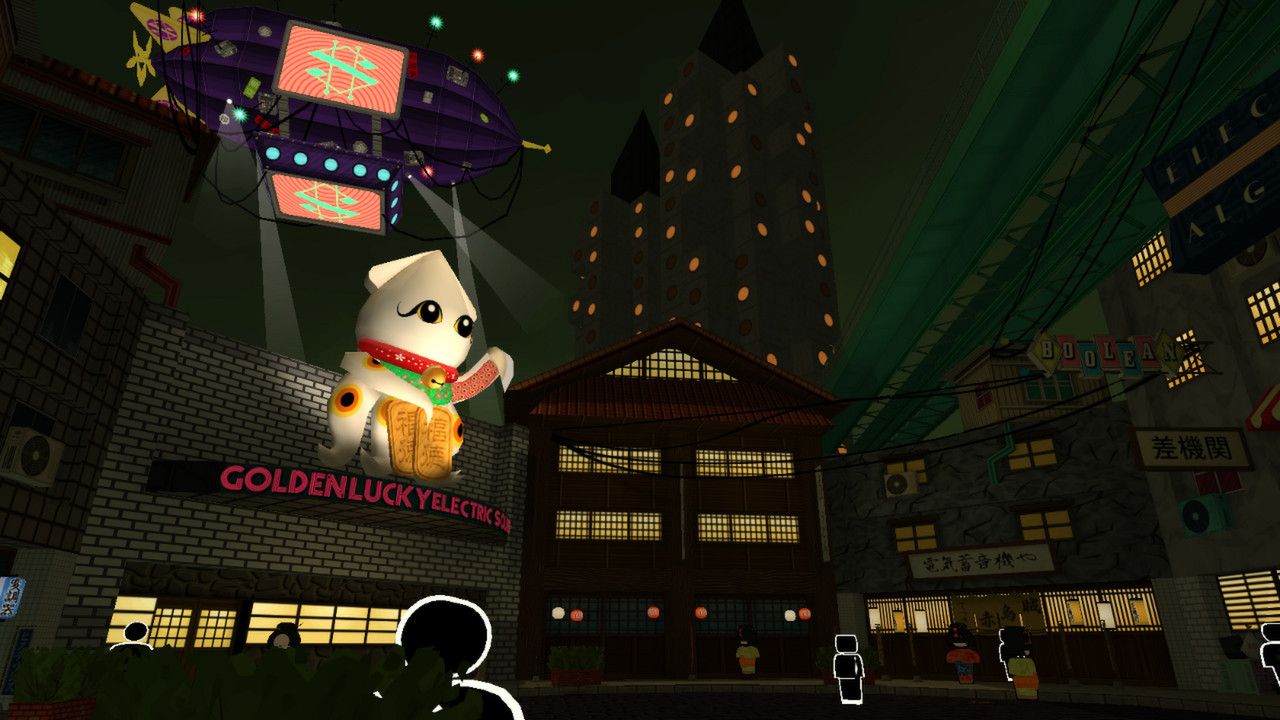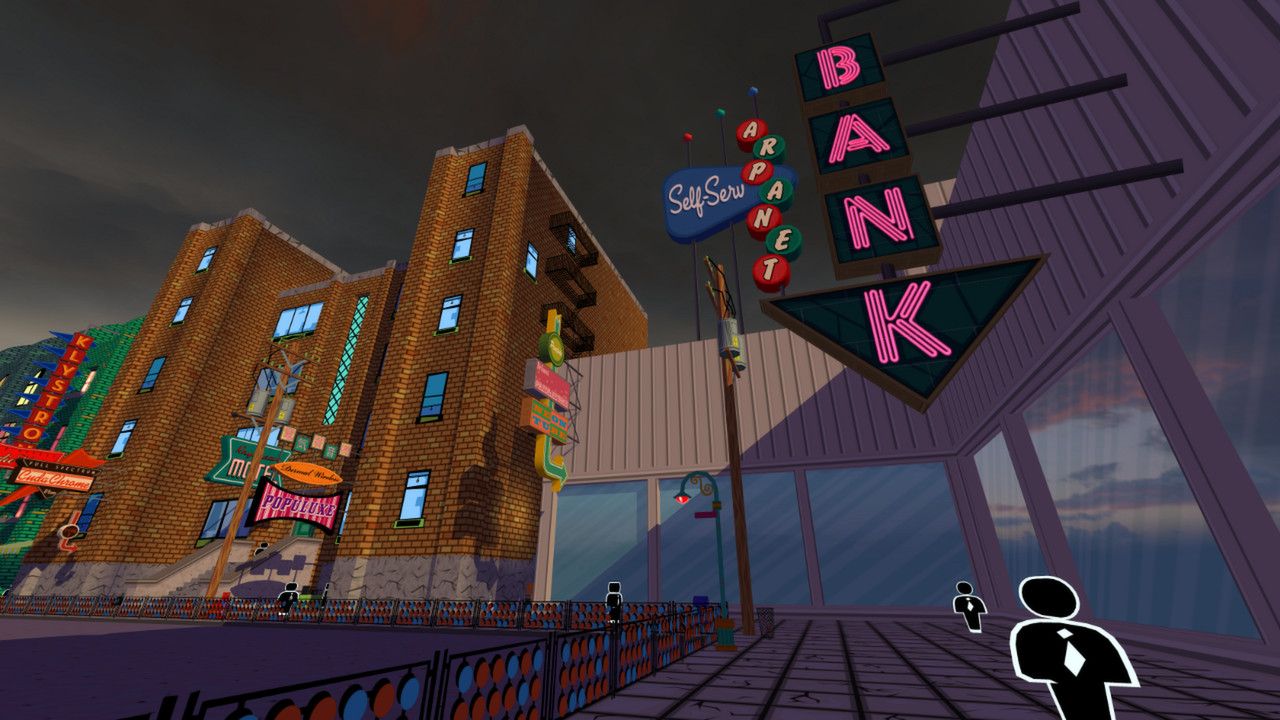Jazzpunk Review
Videogames and comedy commonly have what could best be described as an arm’s-length relationship. There is something of a tendency, in this gritty cynical age of ours, for games to take themselves just a little bit too seriously, and even those that are lauded as centrepieces of hilarity – whether through their dialogue, or their text, or their propensity for letting you wade into combat wielding a giant purple phallic symbol – often treat comedy as more of an extraneous feature than their primary goal. There’s a simple reason for this, of course: a joke cannot survive being re-told (something that a large percentage of Portal fans need to get into their heads) and, in a mainstream game of any reasonable length, avoiding repetition is nigh-impossible. Even a game stuffed with unique content courtesy of the greatest wit money can buy still risks becoming grating if a player gets stuck on the giant robot spider boss for twenty tries or so. So when Jazzpunk, a game created specifically to be funny, petered out after a measly three hours, its comedic reserves utterly exhausted, I didn’t resent it too much. I had paid my meagre sum, the game had done its piece, and we both went our separate ways. Then I sat down, and started to write what I thought about it. More in a minute.

Jazzpunk is one of those games that is liable to get a lot of conflicting labels assigned to it by self-important reviewing types, largely because the TV Tropes pages that list it at an example are likely to be a bit on the hazily-defined side. The overarching theme feels like a parody of a Cold War spy flick, filled with all the things you’d expect to come with the package – exchanging briefcases on park benches, receiving espionage orders from shadowy men in duster coats, swirling cocktails in exotic remote resorts – but it’s all viewed through an Airplane!-esque lens of absurd slapstick, and there’s just enough of a focus on makeshift retro-futuristic technology to earn it a provisional place at the cyberpunk table. You play Polyblank, a nebulous agent whose defining characteristics begin with his name and end with his willingness to ingest whatever is handed to him, whether it’s mystery reality-augmenting pills or an obviously spiked drink. You start by taking a mission to infiltrate a Soviet embassy and then… well, it all gets just a little bit hazy, which is probably entirely intentional. The connection between your environments – not to mention whether or not you are experiencing Jazzpunk’s definition of reality or not – is something that gets kept deliberately in the dark. Sure, it ends with all wrongs righted and the antagonist smeared across a pavement somewhere, but the path towards it is a shaky one, not to mention extremely silly.
Silliness is the order of the day, naturally. Gameplay is essentially a first-person explore-em-up, consisting of a number of areas full of things to poke, push, prod, and some other P-word that means ‘talk to’. Interacting with your surroundings elicits dialogue, reactions, set-pieces or entire hidden areas (I promised myself I wouldn’t use the word ‘vignette’ here, because I have a feeling that if one more person overuses that word then we’ll awaken some kind of game-journalism-themed Lovecraftian entity) and thus, comedy is born. In a way it feels like a heavily cut-down spiritual successor to old first-person point-and-click adventure games like Normality and the later Tex Murphy sequels, though the puzzles are limited to ‘receive item, follow clearly-worded instructions to use item’, so you’re free to wander around provoking whatever insanity you please without worrying about inventory puzzles that run on bug-person logic. The attention to interactivity is something that warms my heart in this age of obsessively-detailed static environments, and lends the comedy a lovely feel of being player driven that tends to be in short supply in, say, Portal, which was more about telling you the jokes over the intercom than letting you cause them.

And yet, there’s something disappointingly inorganic about Jazzpunk. Often it feels more like a gallery than a sandbox, a set of rigidly-controlled gags strategically arranged like the exhibits at the local science museum. Of course, the best comedy is often heavily dependent on its delivery, so a certain amount of control is necessary, but neglecting to mix in some more free-form elements feels like a missed opportunity. Once again I remember the Saints Row games, which demonstrate neatly just how much catharsis can be gained from the simple joy of smacking innocent bystanders about the chops with a giant disembodied tentacle. A game like Jazzpunk, rich with visual humour and overblown slapstick, would have benefited from such a brand of D.I.Y instant gratification to fill the gaps between the scripted sequences, but as it is all you can do is bumble around looking for something else to rub your ‘use’ button on.
Thankfully Jazzpunk is – for the most part – very funny, as it bloody well should be considering that that’s practically its only goal in this storied little world. The game keeps a strong focus on parodies throughout, and they’re generally handled well in the sense that they’re either fairly universally known or general enough to not require familiarity with the source material. Mostly, though, Jazzpunk’s humour stems from its sheer tadpole-gargling absurdity, which is at least a nice break from the asinine pursuit of realism, but it’s relentless to the point of edging on meaninglessness. Occasionally I’d catch myself even adjusting to Jazzpunk’s bizarre world, losing interest in its jarring non-sequiturs as they seemed more and more logical, before finally catching myself and being hit with the full force of the maddening reality of trying to degauss pigeons, or apply lipstick to my face-visor, or harvest organs from a Hunter S. Thompson lookalike. The impact of the comedy was still there, enough to elicit a snort of laughter from the gummed-up workings of my throat, but it could have been so much more with just a gentle sprinkling of magic dust from the juxtaposition fairy.

Some of the levels phone it in a bit too, and to a game like Jazzpunk ‘some’ means a worryingly large chunk of the game. Only three take the form of amusing non-linear playgrounds to gleefully run around in nudging everything in sight, while the rest are much more stumpy affairs about leading you down a narrow corridor with the occasional aside or detour stirred into the mix. Not that linearity is a problem in itself, but the game just doesn’t do anything with its new-found change of pace. I could understand if a linear level was used to unload a set of related, sequenced gags into my joyous upturned face, or used for the purposes of storytelling, but Jazzpunk does nothing of the sort and carries on with exactly the same formula. I wouldn’t say it ruins the levels, but it leaves me once again with a faint sense of being let down.
Another facet of Jazzpunk that it shares with old point-and-click adventures (cast your mind back, please) is that it appears to be going through something of an identity crisis as to whether it’s a game or not. “No, really,” it says, handing me a mysterious device that appears to fire a set of Intellivision sprites. “Look, you can shoot things. Shooting, like in a shooter! Is that not enough? Here, have a fetch quest too! How about some minigames? Action sequences in adventure games always go down well, right? Sierra wouldn’t have done them to death if they didn’t.”

You could make the argument that these features are in Jazzpunk largely to parody existing videogame tropes, and I’d be the first to agree with you there. However, I’d also be the first to point out that they also make for some really rather dreadful gameplay, and that ironically dreadful gameplay is still just as abhorrent as whatever it’s referencing as long as the player has to experience it first-hand. Jazzpunk’s minigames all take the form of clever parodies of retro games – well, depending on your definition of ‘retro’ some of them might hit uncomfortably close to the present – and their controls are, almost without fail, about as tight and responsive as a cruise liner full of bowling balls. There’s a bit near the end where the primary antagonist challenges you to a number of such minigames, and for this very reason I’m still not sure whether they’re scripted to force you to lose or not. You could also make the argument that – apart from that particular example – the minigames aren’t obligatory whatsoever and you’re well within your rights to just leave them in disgust. That’s true as well, but Jazzpunk is a game built entirely around doing things you aren’t obliged to. I could studiously ignore everything in my path and just sprint straight to my objective, but I wouldn’t have much fun, would I?
Really though, we’re well into nit-picking territory by this stage, and I’m about ready to wrap things up. Let’s be nice and clear here: Jazzpunk isn’t a good game. The few aspects of it that resemble gameplay mechanics are awkward at best, but being a game isn’t Jazzpunk’s purpose in life. Some might be put off by its extreme brevity, and that’s fine. Jazzpunk isn’t a time killer either. It knows exactly what it is: it’s three hours of absurd irreverent interactive comedy, and I wouldn’t have it any other way.
